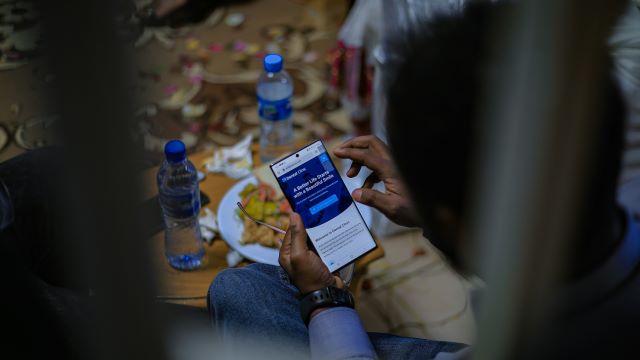BANGUI, Central African Republic — In the cramped glow of a neighborhood internet café in Bangui’s PK5 district, the low hum of desktop fans competes with the clicking of keyboards. On one screen, a new government portal flashes a confirmation code, sent instantly via text message. A birth certificate request, once subject to weeks of delay and unofficial payments, is now processed in minutes.
For a country where bureaucratic transactions have long been entangled in queues, backroom dealings, and the quiet exchange of banknotes, the transformation is striking. The Central African Republic, often counted among the world’s most fragile states, has begun rolling out a sweeping e-government initiative aimed at overhauling public administration, limiting corruption, and restoring a measure of trust in its institutions.
The program, branded e-Bêkou — from the Sango word for “hope” — was launched in February. It offers online platforms for civil registry documents, business licensing, land titles, and tax services. Supported by the African Union’s Digital Transformation Strategy, the World Bank, Estonia’s e-Governance Academy, and the European Union’s Bêkou Trust Fund, the system is designed to bypass entrenched inefficiencies in a state still rebuilding from years of conflict.
“This is about more than convenience,” said Fidèle Koyambounou, director at the Ministry of Digital Economy and Telecommunications. “It is about accountability, and the belief that institutions can serve without exploiting.”
A Digital Leap from a Low Baseline
Connectivity in the C.A.R. remains sparse: just 14 percent of the population has access to electricity, and daily internet use hovers below 10 percent. Yet it is precisely this scarcity, officials argue, that makes digital reform urgent.
Developed with international cybersecurity support, the platform uses cloud infrastructure, biometric logins, and blockchain-backed registries to guard against tampering and data loss. In its pilot phase, over 300,000 civil status documents were digitized — records once kept in vulnerable paper ledgers susceptible to fire, decay, or theft.
“Few post-conflict states attempt reforms of this scale,” said Jean-Paul Ilondo, a regional analyst with the International Crisis Group. “It signals an intent to govern through service delivery, rather than through force or rhetoric.”
Still, concerns remain that the same tools designed to increase transparency could be turned toward surveillance or exclusion if safeguards fail.
Curtailing Corruption in the Code
For many citizens, the most tangible change has been the removal of intermediaries. Transparency International consistently ranks the C.A.R. among the world’s most corrupt nations, with routine administrative processes often requiring unofficial payments. By routing transactions through secure online systems, the initiative narrows the space for informal fees and discretionary gatekeeping.
Civil servants are undergoing training to work within standardized digital workflows. The government has paired the rollout with public outreach via community radio and mobile networks, subsidizing data for platform access. In rural areas, solar-powered kiosks are being tested as hubs for those without personal devices.
“This limits the small pockets where corruption hides,” said Ingrid Balé, a digital ethics researcher at the University of Yaoundé II. “But only if access is universal. Otherwise, the risk is simply shifting inequities from the physical queue to the digital one.”
Bridging Technology and Trust
In remote towns, the state’s presence is often more an idea than a reality. Officials have hosted town hall meetings to explain the system and gather feedback, attempting to root the project in community engagement.
“The technology is a tool, not the answer,” said Sister Thérèse Ouandji, a Catholic nun and community organizer in Bouar. “Trust will not come from a screen. It will come from whether promises are kept.”
The early data offers cautious optimism: more than 60,000 users have registered since February, complaints about forged documents have dropped by over a third, and small business registrations have seen a modest rise.
Global Models, Local Realities
The program’s architects have studied examples from Rwanda and Estonia, where e-governance has transformed bureaucratic speed and transparency. But adaptation is key. In Bangui’s 4th arrondissement, a courtyard has been converted into a “Digital Point” staffed with facilitators who guide residents through account creation and service access. Children play beside a mural reading: Toumba ti data alinga ti gbanga — “The path of data is the strength of the people.”
“Technology alone cannot replace the human element,” said Koyambounou. “But it can make that human element more effective.”
Fragile Progress
With elections approaching and unrest simmering in parts of the country, the initiative’s future will unfold in uncertain conditions. But for now, e-Bêkou stands as one of the rare forward-looking governance projects in a nation where instability has often overshadowed reform.
At the café in PK5, the download bar creeps to completion. A newly issued birth certificate appears on the screen. It is a small transaction, yet for a government seeking to redefine its relationship with its citizens, it carries weight beyond the page.
Sources:
- African Union. Digital Transformation Strategy for Africa 2020–2030. Addis Ababa, 2020.
- International Crisis Group. Rebuilding Trust in Central African Governance. Brussels, 2024.
- Transparency International. Corruption Perceptions Index 2023. Berlin, 2024.
- World Bank. Central African Republic: Digital Governance Project Overview. Washington, D.C., 2024.

